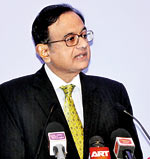Tax holidays and tax free zones could hurt a developing country’s tax base – Chidambaram
View(s):India’s experience shows that “simple and clearly-worded tax laws, moderate rates of taxes, low compliance costs, a non-adversarial tax administration, and a fair and impartial dispute resolution mechanism will enlarge the tax base and boost revenue collction”, according to Palaniappan Chidambaram, a former Union Minister of Finance and Home Affairs of India.
 Mr. Chidambaram made this comment at the 20th Annual Tax Oration of the Institute of Chartered Accountants of Sri Lanka, held recently in Colombo, where he spoke on the topic of “Challenges Faced by Emerging Economies in Revenue Collection”.
Mr. Chidambaram made this comment at the 20th Annual Tax Oration of the Institute of Chartered Accountants of Sri Lanka, held recently in Colombo, where he spoke on the topic of “Challenges Faced by Emerging Economies in Revenue Collection”.
Commenting specifically in terms of the Sri Lankan context, Mr. Chidambaram went on to add, “It appears that, like in India, you have a plethora of taxes: some major taxes and several minor levies and cesses. Some taxes yield a significant sum while others earn miniscule amounts even as they make the tax structure complicated. A large proportion of your total tax revenues is collected from international trade.
A study made some years ago had concluded that your corporate tax performance was quite poor in terms of both tax revenues and tax efficiency, attributing the outcome to the wide ranging tax holidays and incentives that you had offered to companies. It appears that such exemptions and concessions were continued in the Budgets of 2012 and 2013 to both domestic and foreign investments in the desired sectors”.
Further, he also opined, “Some of the incentives and concessions are embedded in Bilateral Investment Treaties. I am told that Sri Lanka has signed 24 such treaties beginning with the first treaty in 1980. While the intent is clear, there is a growing body of evidence that has called into question the effectiveness of offering tax incentives to promote investment including, in particular, tax holidays and tax free zones. Such incentives are not an alternative to a poor investment climate and may actually damage a developing country’s tax base. The real drivers of investment are infrastructure, education and security”.
Additionally, Mr. Chidambaram also noted that the “Asian Development Bank’s Development Outlook 2013 mentions that the main cause of your low tax ratio has been VAT which was introduced in Sri Lanka in 2002. It accounts for about one-fourth of Sri Lanka’s revenues. VAT collections have declined from 5.8 per cent of GDP in 2004 to 2.7 per cent of GDP in 2012. It is believed that VAT collections have continued to decline because of exemptions, poor import performance since 2009, and unification of rates at 12 per cent in 2011.
The report also says that faster growth in the post conflict period and rise in per capita income have not resulted in boosting revenue generation. Tax buoyancy in Sri Lanka has been estimated to be about 0.78 per cent in the five year period till 2013, meaning that tax collection has not been responsive to the pace of economic growth. I can understand your concerns because all developing countries, including India, have experienced the challenges of low tax to GDP ratio and low tax buoyancy. The answer lies in expanding the tax base – that is bringing more people into the tax net without violating the principle of equity and promoting a culture of voluntary tax compliance”.
Remarking on the current challenges faced by the world’s economies, Mr. Chidambaram signalled that the “unconventional remedy of Quantitative Easing adopted by the US caused a rush of money into developing countries. The opposite happened at the hint of withdrawal from Quantitative Easing. There was an outflow of money, and the exchange rates of many currencies were affected. Even as they are coping with the after-effects of the US’ actions (taken obviously in its self-interest), developing countries are now faced with a slowing of growth of the world’s economy caused mainly by the sharp slowdown in China”.
He also pointed to potential threats to countries from multinational corporations, identifying the fact that “(many) developing countries are yet to get the measure of such companies and devise a comprehensive strategy to deal with them. Developing countries need them because they bring investments and create jobs. Developing countries are wary of them because, with their vast resources and extraordinary access, they can overwhelm tax administrations and deprive the country of its legitimate revenues”.
Mr. Chidambaram also commented on what he called an “ambitious effort started in 2007 to rewrite the laws on direct taxes, mainly income tax and corporation tax” in India, the proposed Direct Taxes Code, which is yet to be implemented. Highlighting its key features, he stated that, “(in) the case of income tax, the principle will be ‘tax liability should be according to the ability to pay’, those with equal abilities would pay equal taxes and those with higher abilities will pay proportionately large amounts. The total income of a person or a corporation will be the measure of ability to pay. The definition of income will be comprehensive enough to include all accruals. In the case of corporation tax, all profits will be taxed”.


